Peter MALONE
Saturday, 18 September 2021 20:01
Alvin and the Chipmunks: The Road Chip
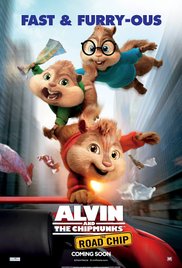
ALVIN THE CHIPMUNKS: THE ROAD CHIP
US, 2015, 93 minutes, Colour.
Jason Lee, Kimberly Williams- Paisley, Josh Green, Tony Hale, Bella Thorne.
Voices of: Justin Long, Matthew Gray Gubler, Jesse Mc Cartney, Christina Applegate, Kaley Cuoco, Anna Faris.
Directed by Walt Becker.
The Alvin and the Chipmunks films are definitely for younger audiences – and it is somewhat surprising to find reviewers and bloggers, for instance on the IMDb site, berating the film for not being more adult, sensible, deriding it as silly. Other bloggers, especially parents, say that this is the choice of film that their little children enjoy. (It is as if reviewers were considering dolls and other children’s toys and condemning them from an adult perspective.)
This is not to exclude the fact that many adults probably find the chipmunks quite irritating, their voices, their behaviour, but would be prepared to put up with this for the sake of the children.
Jason Lee, as Dave, is somewhat heroic as having appeared in all the Chipmunk films, being a great buddy with them, often finding them exasperating, as he does in this one, but eventually going to officialdom to properly adopt them! Kimberly Williams-Paisley? is a pleasant presence, although the chipmunks are not very happy with her and the prospect of David marrying. Her son Miles, Josh Green, is particularly obnoxious to the chipmunks, but, they save him when he is absent-minded in the street and almost knocked down by a car and gradually, they all bond in a common cause.
The chipmunks misbehave at the opening of the film, throwing a party with the Chippettes and trashing Dave’s house. Well, not all of them, Simon is much better behaved than Alvin! Dave takes them to minigolf to meet Samantha and they later find a ring. He reprimands and goes off to Miami to launch a singer and her recording. The chipmunks assume that he is going to get married and, having encountered air martial, Tony Hale, Theodore petting animals loose on the plane and so clashes with them, they are ordered off planes and therefore have to go by road. There is quite some slapstick comedy with the air marshal.
In the meantime, they have drugged three squirrels and dressed them up as the chipmunks to deceive the shortsighted neighbour, an amusing cameo by Jennifer Coolidge, to think they are still at home and to reassure Dave by phone when he rings.
There is another amusing cameo with the director, John Waters, with some adult references to his films and filmmaking, like Pink Flamingos.
As they go along the road, with Miles, they get to New Orleans and perform some songs there. Dave eventually catches up with them, they realise what is really happening, they return to Los Angeles for their adoption and there is happy ever after – at least until the next Chipmunks film.
Published in Movie Reviews
Published in
Movie Reviews
Tagged under
Saturday, 18 September 2021 20:01
Man of the House/ 1995
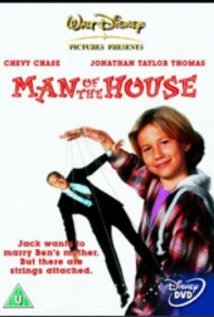
MAN OF THE HOUSE
US, 1995, 96 minutes, Colour.
Chevy Chase, Farrah Fawcett, Jonathan Taylor Thomas, George Wendt, Art La Fleur, Richard Portnow, Chief Leonard George.
Directed by James Orr.
Man of the House is a Disney comedy featuring popular stars of the time, especially Jonathan Taylor Thomas who starred in Home Improvement. Chevy Chase had been around for many decades in comedies. Farrah Fawcett had been a star with Charlie’s Angels.
The theme is a familiar one, a father walking out on his family with his secretary, mother and son bonding over the years, the mother eventually wanting to remarry but the son fearful that he will lose his mother.
The serious aspect and comic aspects of the film concern the boy and his antagonism towards his possible stepfather, a serious lawyer, Jack, who had gained the conviction of a drug dealer who then threatened him with death. The boy gets the idea of getting Jack into the Indian Guides, making it awkward for him and humiliating him. Nevertheless, Jack perseveres – but all comes to a head when the thugs pursue Jack in the forest and the boy has to help him to survive.
The film was very popular at the time, family audiences liking it and finding it very funny.
1. A Disney comedy about family? The background of divorce and remarriage, children and their fears? Possibilities for bonding?
2. The Seattle setting, the home, the law firm, the courts, the forests, action in the forest? The musical score? The range of songs?
3. The cast, Chevy Chase and his popularity, Farrah Fawcett from Charlie’s Angels? Jonathan Taylor Thomas from Home Improvement?
4. The opening situation, Sandy and Ben, the father and his girlfriend leaving, waving, disappearing? Ben at six? The next five years? In Seattle, the bond between mother and son?
5. Sandy, character, love for her son, deciding to remarry, the meeting with Jack, falling in love? His moving into the loft? trying to bond with Ben? Sandy fostering the relationship?
6. Ben, a touch precocious, memories of his father leaving, not wanting to lose his mother, antagonism towards Jack? His behaviour towards him, manner of speaking? At school, his plotting, the YMCA and the Indian Guides? Forcing Jack to become part of the group? The outings, in the forest, Jack and his awkwardness, being humiliated? Jack persevering? Camp storytelling?
7. Ben, his friends at school, Jack overhearing Ben boasting about what he had done?
8. Jack, continuing to go along with things, his hopes, outreach? His work in the court, Frank Renda, drug dealing, found guilty, and his threats, his son and his threats, his gangster associates? Plotting against Jack?
9. Jack and his discussions with Chet? Chet and his stepson, the same problems as Jack had, giving advice?
10. In the forest, Jack, the brakes on his car, going into Puget Sound, the thugs pursuing Jack in the forest, Ben and his realisation of the truth, collaboration with Jack, the other boys and the other fathers?
11. The farcical confrontation with the gangsters? But the happy ending – and everyone reconciled, the wedding, The Indian Guides present?
Published in Movie Reviews
Published in
Movie Reviews
Tagged under
Saturday, 18 September 2021 20:01
Remembering the Man
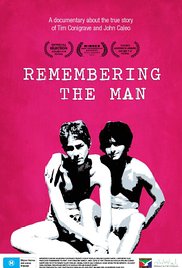
REMEMBERING THE MAN
Australia, 2015, 86 minutes, Colour.
Directed by Nickolas Bird, Eleanor Sharpe.
The title of this documentary is a variation on Holding the Man, the memoir written by Tim Conigrave, published posthumously in 1995, about his relationship with John Caleo from their time at Xavier College in 1976 to John Caleo’s death from AIDS in 1992. Tim Conigrave himself died from AIDS in 1994. His memoir was soon adapted for the stage and, in 2015, the film version, directed by Neil Armfield was released to critical acclaim.
The emphasis in the first half of the film is on the relationship between the two boys at school, its development over the years, the change in relationship of each boy in his early 20s, and their initial careers. While this story continues, in the second half of the film the focus shifts to the AIDS epidemic. In fact, at the end of the film, there is a statement that Holding the Man is a key contribution to the history of the pandemic in the 1980s and into the early 1990s.
Those who have read the book, or seen the play, or seen the film, we will be familiar with most of the events which are portrayed here. Of course, the Holding the Man screenplay amplified many of the events noted here – but this film gives far more attention to the acting career of Tim Conigrave and his play and its performance, Soft Targets.
The film makers have been able to assemble a great number of photographs of the two boys, of the two men, as well as quite some video footage. They are incorporated into the narrative of this film. When photographs or video material is not available, some actors portray the two men, their parents, and some others associated with them in dramatic portrayals.
As with most documentaries, there are many interviews and talking heads, from school friends from Xavier days, both men and women, from friends who shared houses with them, with many who studied at NIDA with Tim Conigrave, and the number of men and women who were involved in social work and hospital care. The impression that they all give is that John Caleo was a quiet young man, a talented sportsman, and effective chiropractor, the more stable of the two, while Tim Conigrave was quite flamboyant from his earliest years, something which developed in his theatrical interests, his theatrical training and performances.
One of the values of this film is that there are considerable excerpts from three audiotapes of interviews which Tim Conigrave made in 1993 for a National Library project of witnesses to the experience in Australia of AIDS. It is interesting to listen to the tone of voice, generally quite sober, and, Conig recollections – much more serious than many of the photos and video excerpts that are shown. He was only a year or so away from his own death.
There is a lot of historical footage from the 1970s, especially with public opinion against homosexuals, scenes from Gay Mardi Gras as well as scenes of protest, especially some led by the Rev Fred Nile, quotations from the book of Leviticus, and other denunciations and, in more secular sequences, for example from Australian television in 1976, Monday Conference, a great deal of poofter-bashing. This gives the context of the relationship – something which has changed fairly extensively in the subsequent 40 years.
Tim Conigrave is supportive in his opinions of the Jesuits who ran Xavier College, a re-enacted scene with a priest at a holiday house and finding the two young men together and leaving them be. The understanding of the Jesuits is named explicitly Conigrave.
As regards the funeral Mass for John Caleo Kelly (somewhat contentious in Holding The Man), at which Father Peter Wood MSC, the AIDS Chaplain in Melbourne at the time, presided (who is credited as one of those interviewed for the film), it is mentioned that there were six priests present – although, as in the movie, but much more explicit here which does explain the funeral sequences in the movie, John Caleo’s father was quite clear to Tim Conigrave that there was to be no mention of homosexuality or AIDS and that Tim Conigrave was not to sit with the family. There is a very disappointing priest postscript when one of the friends explains how Tim Conigrave had asked these friends to light candles for him in the church (St Patrick’s Cathedral), but a priest tells them to go away and is seen locking the iron gates against them and walking away. However , there is religious feeling as the camera goes inside a church, a Catholic Church, and tracks up to the altar where there is a photo of the two men (and a Mickey Mouse doll which Tim Conigrave used as a symbol of himself).
Some of the images in Fairfield Hospital and St Vincent’s Hospital of AIDS sufferers are quite graphic and bring home to audiences just how surprising, shocking and disturbing this new epidemic was and the toll that it took on those who were positive and who died of AIDS .
A significant film for going back into Australian gay history as well as the Australian experience of the beginning of AIDS and the development in the 1980s and 1990s.
Published in Movie Reviews
Published in
Movie Reviews
Tagged under
Saturday, 18 September 2021 20:01
Sunrise/ India
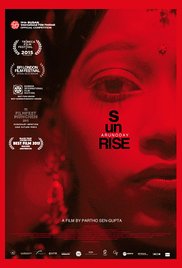
SUNRISE
Indian/France, 2014, 85 minutes, Colour.
Directed by Partho Sen- Gupta.
Sunrise is a police thriller set in the city of Mumbai, highlighting its darker side and police work. It is an Indian film with French financial backing.
While the film has an atmosphere of realism, with its moving into different time periods and with dreams and hallucinations, it is also quite surreal. It is also surreal in its style of photography, light and darkness, especially darkness.
From a linear point of view, the film concerns a police inspector whose six-year-old daughter was to be picked up from school but is abducted. The film goes back to the days of the wife’s pregnancy and her relationship with her husband. However, the abduction has had a physical and mental toll on the wife.
There are scenes of the police Inspector at work, seemingly a loner, often driving alone in his car, sitting at his desk, the little boy in the office bringing tea around to the other officers, one reading poetry, the other on the phone and compiling files.
There is also a little boy who hangs around the police station, with the other police wanting to be rid of him, explaining that his father is violent towards him – then the police are called out to the house, finding the father dead, stabbed, the wife grieving, the children upstairs playing, and the young boy covered in blood with a knife.
In the boy’s hand is a card with the name of the nightclub on the back, Paradise. In reality and in dream, the police Inspector has visited the Paradise, sitting amongst the audience, seeing a group of rowdy men harassing the girls dancing on the stage, one showering them with money – and, in one of the sequences, real or imaginary, the inspector punches one of the men.
In the meantime, the film shows the background, extremely seedy, of sex slavery in the city, a matronly woman being in charge, dressed beautifully in a sari, easily lying to the police as she conceals the girls in the roof when the premises are inspected. The girls are young, having been abducted, forced into prostitution and dancing in the club. The film shows a young girl has been abducted, is taken in charge by a sympathetic dancer who then goes out and is bashed.
When the Inspector goes to the Paradise, he imagines going behind the stage into a long tunnel, finding the girls, seeking out his daughter, her appearing and calling out to him.
The film is atmospheric, inviting audiences into the underworld of Mumbai, of the pressures on police work, on the sleazy cruelty of the sex trade, and the personal anguish of the family whose daughter has been abducted.
Published in Movie Reviews
Published in
Movie Reviews
Tagged under
Saturday, 18 September 2021 20:01
Poet in New York, A

A POET IN NEW YORK
UK, 2014, 72 minutes, Colour.
Tom Hollander, Essie Davies, Phoebe Fox, Ewen Bremner.
Directed by Aisling Walsh.
The poet of the title was the Welsh Dylan Thomas, celebrated in his lifetime for his distinct, use of language and rhythms, his down-to-earth themes as well as his imagination and fantasy, and his achievement in his play, Under Milkwood.
This film is very brief yet covers a lot of Dylan Thomas’s life, the framework being his last visit to New York, under the auspices of his agent Brinnin (Ewan Bremner) and his associate Liz, (Phoebe Fox). Dylan Thomas is played by Tom Hollander, in the last weeks of his life in New York, aged 39, drinking, with cirrhosis of the liver, unfaithful to his wife at home, being sick, having blackouts, cortisone injections, giving readings of his poetry as well as a reading performance of Under Milkwood.
There are quite a few flashbacks to his life back in Wales, his marriage to the fiery dancer, Caitlin (Essie Davis), their children, the detail of the home life, his difficulties in writing at home, his passionate love for Caitlin despite his infidelities. At the end, she is called to visit him in the hospital in New York, still passionate for him, a tantrum of clinging to him as he died.
While the film celebrates his achievement, there is great regret at his ruining his life, at his early death. It was written by the celebrated adapter of so many novels on Jane Austen, Dickens, Tolstoy, Andrew Davies.The film was directed for television by Irish director, Aisliing Walsh, a prolific director of television films but also of other films including two on sexual abuse in Ireland, Sinners and Song For a Raggy Boy.
1. A film about Dylan Thomas, his poetry, love of language, reputation? his drinking, his infidelity, his death at 39? Audience knowledge of Dylan Thomas and his work?
2. A brief telling of his story, the focus on Dylan Thomas in New York, the friendship with Brinnin and with Liz, the New York sequences, performance, Society gatherings, after-performance parties, the bars? The contrast with Wales, the coast, the beaches, the house? The musical score?
3. The inclusion of recitations of Thomas’s poems throughout the film? The verbal power? Tom Hollander’s recitation? The poem of going into the dark good night, his father’s illness and death? The rehearsals and performance of Under Milkwood?
4. The flashbacks, Thomas as a little boy, the children chasing and persecuting him, his difficulty in breathing, the effect on him? Growing up, his relationship with his mother and father, his father stern and not wanting to give him any money, especially for drinking, talking about his reputation? His intimations of regret about his marriage? His bequest to his son and admiration for his skills? His mother, indulgent, winking at him?
5. Caitlin, his story of falling in love with her, the marriage, her pregnancy, the children? On the beach, showing her the house, having the key? The donation from an admirer? Her background in dancing, her moodiness, her domination of her husband, his trying to write, her tidying the house? Her tantrums, with Brinnin and the visitors? His trying to persuade her that he should go to New York? Her visit and disliking it? Her coming to him when he was ill, her behaviour at the hospital, her desperate love, clinging to him?
6. Brinnin, as an agent, meeting Thomas, supporting him, and admiring the performances, and announcing him even as he had been vomiting? Applause? Arranging the tours? Dylan and his insulting him, saying that Brinnin had him on a leash? Liz reprimanding him? The embrace and his apology? His going to the rival agent? Brinnin and his visits to Wales and meeting Caitlin and trying to persuade Dylan to go to America? The promise of meeting Stravinsky? The collaboration? Liz remarking that Brinnin was in love with Thomas?
7. Liz, devotion to Dylan, the sexual relationship, her being a mother, pharmacist, nanny? The continued support? The disappointment at his rudeness to Brinnin? His carrying on with other women? Meeting them at parties, seductive invitations, especially the sequence with the Countess?
8. Brinnin and Liz at the hospital, mourning his death?
9. The doctor and his pharmaceutical support, cortisone injections? The other admirers, fawning on Thomas, suggesting available women?
10. A portrait and a glimpse of a significant poet, his talent, yet his drinking himself to illness and death?
Published in Movie Reviews
Published in
Movie Reviews
Tagged under
Saturday, 18 September 2021 20:01
Elstree 1976
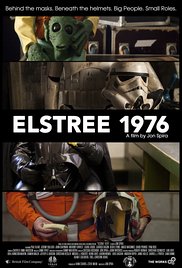
ELSTREE 1976
UK, 2015, 90 minutes, Colour.
Paul Blake, Jeremy Bullock, John Chapman, Pam Rose, David Prowse.
Directed by Jon Spira.
This is a documentary particularly interesting for cinema buffs but, especially, for the Star Wars Fans. It was released at the time of the new Star Wars film, 2015, The Force Awakens.
The director has gone back to Elstree studios in London in 1976, George Lucas coming from the United States to make a science fiction film, which nobody knew much about – nor so much about George Lucas himself, though he had just directed American Graffiti which the studios were puzzled as to how to promote.
Elstree provided vast sets and this film takes us onto the sets, some glimpses of the main stars, Mark Hamill, Carrie Fisher, Harrison Ford, and sequences from the film along with some of John Williams’ music.
The bulk of the film is interviews with nine men and one woman who had bit parts or brief characterisations in the film. There are glimpses of at the time and long interviews with each of them almost 40 years later. Most of them are interesting personalities, communicating well to camera, indicating their situation at the time they were auditioned and cast in Star Wars, appearing in small roles, having other jobs, doing technical work around the studios, as was Pam Rose, the only woman interviewed.
It is interesting to hear these characters reflect on their experience, the importance of the long retrospect, their subsequent careers, appearing in films, or moving away from show business, even to writing and publishing books.
Those who know Star Wars in detail will recognise the people being interviewed.
Of major interest is David Prowse, who was the figure of Darth Vader, interviewed 40 years later, reminiscing, having fallen out with George Lucas, but giving an insight into his career of a weakly boy becoming a bodybuilder, appearing in Kubrick’s A Clockwork Orange, carrying Patrick Magee in the home sequence, and his subsequent work.
Many of these actors go to the conventions where the fans thronged, dressed up, sought the memorabilia, and wanted autographs – enabling these characters to be celebrities for those moments.
1. A film for film buffs in general, for fans of Star Wars?
2. The film produced in 2015, for the new Star Wars Film, The Force Awakens?
3. The retrospect of Elstree in 1976, the British film industry, the studios, the filming of Star Wars, the presence of George Lucas, sets, cast, action? The musical score and use of John Williams score?
4. The inclusion of actual sequences? The title, the focus on 1976, the beginning of the new Star Wars era?
5. The audiences, memories of Star Wars, after 40 years, the age of people at its first release, the subsequent 20 years, the next trilogy, audience knowledge, able to repeat lines and scenes, the merchandise and souvenirs, the science-fiction conventions and meeting the actors, dressing up as characters? The influence of Star Wars on the imagination?
6. Going back into the past, the young men and Pam Rose and their being cast? The scenes of them at the time? Hopes, ambitions, acting, non-actors? The interviews almost 4 decades later? Seeing some of them at the conventions?
7. Their contribution to understanding the myths of Star Wars from their own experience, the background of making the film, discovering George Lucas and his imagination? Wars, myths, heroism, characters, chivalry, in space, conflicts of good and evil, the importance of The Force? And the presence of a Guinness?
8. The world not prepared for Star Wars? George Lucas and his career, imagination? His plans, the interviews, his interviewing the cast, the presence of the stars, the details of the production, the sets? The personality of George Lucas?
9. The range of interviewees, men and one woman, their careers, subsequently, bit players, character actors, their life stories, their roles and the effect on them, the impact of the experience, the later careers, film careers and other careers?
10. The focus on David Prowse, his being Darth Vader, young, weak and ill, strengthening his body, the bodybuilding, his work Stanley Kubrick and the scenes from A Clockwork Orange? Overcoming illness, a stronger man, in the film? Yet his observations on his clash with George Lucas and the falling out with him?
11. The conventions, the actors and their presence, the admiration of the fans, the memorabilia, the costumes, the autographs, their becoming celebrities for the moment?
12. Insights into show business and filmmaking and the impact of Star Wars?
Published in Movie Reviews
Published in
Movie Reviews
Tagged under
Saturday, 18 September 2021 20:01
Silent Hill
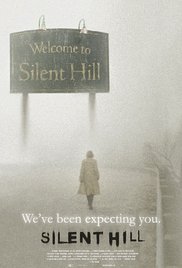
SILENT HILL
Canada/France, 2006, 120 minutes, Colour.
Radha Mitchell, Sean Bean, Laurie Holden, Jodelle Ferland, Deborah Kara Unger, Kim Coates, Tanya Allen, Alice Krige, Robert Campanella.
Directed by Christophe Gans.
This is quite an exotic horror tale (though it was only at the end that I discovered it is based on a computer game). Written by Roger Avary (Kill Zoe and co-writer with Tarantino on Pulp Fiction) and directed by Christophe Gans (The Brotherhood of the Wolf) and a Canadian/French co-production, it is actually set in the US, in the forests of West Virginia.
A very intelligent reviewer remarked at the end that he could not follow it at all. This may be the case for many viewers – although it is designed only for horror fans and computer game players and they are very much ‘in’ on the conventions, the influences and the horror logic of this kind of thing.
It is given very stylish treatment and many companies contributed to the considerable special effects – involving mime artists, barbed wire and the creation of a kind of inferno, as well as a spacious church and the streets of a modern city simply left in the middle of things as a ghost town in the 1970s. The widescreen format is both attractive and overwhelming.
At first look, the plot is fairly straightforward: strange adopted girl has nightmares and sleepwalks; mother avoids psychiatrists and takes her to the town she mentions in her dreams. Wrong move! It is a coalmining town, Silent Hill, where a fire disaster occurred in the mine and it was hurriedly evacuated. Pursued by an earnest motorcycle cop, she finds herself in an ashen-grey Silent Hill, ash still falling. She searches for her daughter but suddenly sirens go off, darkness descends and all kinds of monstrosities appear. Needless to say, she perseveres and wins over the cop. What they also discover is a strange apocalyptic and puritanical, witch-hunting sect who have killed a little girl and exiled her mother (not hesitating to literally cast the first stone).
This is where it does become complicated, but viewers will realise that the film is showing two concurrent worlds, the world of ghosts where the mother is, and the brightly coloured actual world where the father is searching for his family. And, if you pay attention, especially to the words of the sect leader (an icily frightening Alice Krige), you will work out what happened back then and what is happening now and what is happening in the hell or limbo where most of the action takes place.
It is definitely a women’s film. The men are merely supporting cast. Radha Mitchell as a strong personality and is able to carry the film with her anxiety, being terrorised but becoming more determined. Laurie Holden is the policewoman.
There are a few lines that have a touch of bathos but that does not undermine the film, but it is definitely one for horror fans.
1. The impact of the film? Horror? Thriller? Based on computer games? Survivor games?
2. Canadian production, the setting of West Virginia? Locations, the recreation of Silent Hill, normal, pervaded by fog and the darkness? The atmospheric musical score?
3. The introduction to Rose and Christopher, travelling, Sharon as their adopted daughter? Sharon, at the gas station, the drawings? The disappearance?
4. Rose, the accident, the role of Sharon? Sharon’s nightmares, Silent Hill? Sleepwalking and calling out?
5. Rose, Cybil, the encounter, possible arrest, their combining together to search?
6. Rose, wandering, Silent Hill, the transformation, the darkness, the creation of the monsters? The encounter with Dahlia? The story about Alessa and the people attacking her?
7. Rose, the locket, Dahlia seeing it, the resemblance between Sharon and Alessa, stealing it? Rose arrested, the huge crevice? The continued search?
8. The character of Pyramid Head, monster, vicious, his destruction of people?
9. The contrast with Christopher, his search, the encounter with Thomas Gucci? The documents? The history of Silent Hill, the coal seam fire, its spread, the church? Witches?
10. Anna, the darkness, fire and the destruction of the church?
11. Christabella, the leader of the cult, the photo, the background of witches?
12. Rose in the basement, the two Alessas, Sharon and Alessa, the witchcraft?
13. Alessa, catching fire, the two Alessas? The plot and the confrontation?
14. Christabella and Rose, stabbing, the blood, Alessa coming out, the darkness, the wire, bisecting Christabella? Fear?
15. Rose leaving, Dahlia staying, Christopher in the ordinary world , Rose and the two girls trapped in Silent Hill?
Published in Movie Reviews
Published in
Movie Reviews
Tagged under
Saturday, 18 September 2021 20:01
Free and Easy
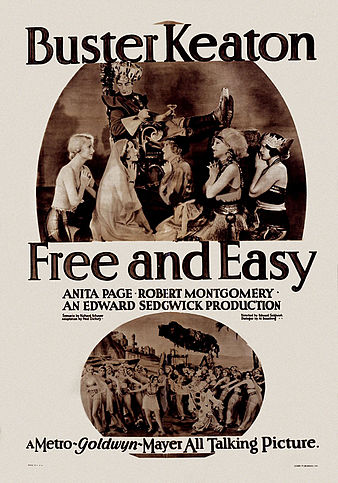
FREE AND EASY
US, 1930, 92 minutes, Black and white.
Buster Keaton, Anita Page, Robert Montgomery, Trixie Friganza, Fred Niblo, Lionel Barrymore, David Burton, William Haines.
Directed by Edward Sedgwick.
After successful films in the 1920s, silent films, like The General, Buster Keaton moved into the sound era. This was his first sound film. He was to continue, with ups and downs, until the mid 1960s with A Funny Thing Happened on the Way to the Forum. Donald O’ Connor starred in 1957 in The Buster Keaton Story.
This is a Hollywood film, although it starts in the midwest, a young woman, Anita Page, travelling with her dominating mother, Trixie Friganza, goes to Hollywood for an audition. She is chaperoned by a town official played by Buster Keaton who is one of those sad little men that he portrayed so often, subject to a great deal of slapstick early in the film trying to get on and off the train. On the train is a heartthrob played by Robert Montgomery, sure of himself, ingratiating himself with the young woman.
The film is a great deal about Hollywood, including a film premiere with Buster Keaton finding himself on stage with actor William Haines in some farcical situations. He is excluded from the studios but tries to get in, with all kinds of ruses and disguises, wanders the sets, encounters actual directors Fred Niblo and Lionel Barrymore at work with their films. The young girl has some auditions, gets some roles – and there are some quite lavish presentations of film styles of the time, especially elaborate musicals with choruses.
Keaton is also offered an opportunity to appear in a film, in costume, but he makes a continual hash of his lines, all kinds of slapstick comedy as he ruins the filmmaking.
The mother also gets a film contract and throws her weight around.
Finally, Keaton who is in love with the young girl tries to explain his love for her but she interprets this as his giving good advice as to her response to Larry and his overtures.
Published in Movie Reviews
Published in
Movie Reviews
Tagged under
Saturday, 18 September 2021 20:01
Jungle Book 2, The
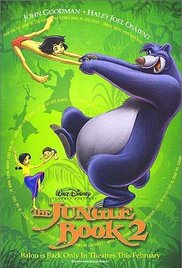
THE JUNGLE BOOK 2
US, 2003, 72 minutes, Colour.
Voices of: John Goodman, Haley Joel Osment, Mae Whitman, Connor Funk, Bob Joles, Tony Jay, John Rhys- Davies, Jim Cummings, Phil Collins.
Directed by Steve Trenbirth.
The Jungle Book 2 is a brief sequel to the original Disney animated film of 1967, following a trend of this period at the Disney studios to provide brief sequels to their main successful films like Lady and the Tramp, Cinderella, Sleeping Beauty, The Lion King.
The main feature of this sequel is that Mowgli is now living in the village, having left the jungle behind but still pining for it, under the care of benign father and mother, the father voiced by John Rhys- Davies. Mowgli is voiced by Haley Joel Osmond just after his success in The Six Sense and at the time of Pay It Forward. One of the main attractions is to have John Goodman as the hefty bear, Baloo, Phil Harris in the original – and capitalising on the popular song of the original film, The Bare Necessities.
Tony Jay does a good imitation of George Sanders’ voice as the sinister tiger, Shere Khan. Mae Whitman is the voice of Shanti, an attractive young girl in the village who Mowgli says he is not interested in, but… In the jungle there are the familiar animals, the black panther, the sibilant snake who becomes the butt of a lot of physical comedy, the monkeys and featured particularly, the elephants.
The opening is rather sugary with Mowgli in the town, his adoptive parents and their mischievous little baby boy who gets into the action when everybody starts searching for Mowlgi in the jungle.
Mowgli tries to get everyone to go into the jungle but is confined to the house. But, he comes across Baloo and off they go, singing and dancing, meeting all the animals, enjoying their friendship and the spirit of the jungle. But, Shere Khan has a long memory and tries to track down Mowgli, even going into the village, terrorising Shanti, but eventually overreaching himself and falling into a pit.
There are mild adventures which should entertain the young audience, especially those who want more after seeing the original Jungle Book. But, it is brief, derivative, something of a repetition, not a substitute for the original – but a light entertainment.
The Jungle Book was filmed in 1942 with the actor Sabu. There was a lavish re-make in making 2016, live-action for Mowgli and the animals, but the voices of a top cast, including Bill Murray as Baloo.
__
2002
Everybody enjoyed The Jungle Book. In theatres, on video, it is a very popular film.
It is something of a shock to realise that it was first released in 1968. Children who were ten at the time and enjoyed it are now on the verge of being grandparents. It has taken thirty five years to make a sequel. There have been two live-action versions of The Jungle Book, but Disney's cartoon has remained the favourite.
The Makers of Jungle Book 2 have been careful to stay close to the original. The drawings are the same. All the familiar characters are there: Mowgli, of course, and Baloo; Bagheera returns as does Kaa, who is still trying tro hypnotise a potential lunch; the Elephant Colonel is still leading the parade. And there is no more sleek and cunning a villain than Shere Kahn. In case anybody has forgotten, Baloo and Mowgli burst into song several times with The Bare Necessities.
Sadly some of the voices from the 1960s are no longer with us. While Phil Harris made a boisterous Baloo, now John Goodman is equally boisterous. The producers have gone for quality for the voice of Mowgli. It is Haley Joel Osment from The Sixth Sense and AI: Artificial Intelligence. While George Sander's voice made for a smootlhly sinister Shere Khan, Tony Jay now does an excellent impression. Most audiences will not notice the new cast and will be content with how well done the sequel is.
At 75 minutes, it is full of action, humour and colour to entertain young children. The story is simple. Mowgli has settled down with a family in a village but he remains restless. His foster mother says that you can take the boy out of the jungle but you can't take the jungle out of the boy. When he returns to see his friends, he has a wonderful time. Shanti, the daughter of the family goes searching for him (at night, of course, with plenty of owls and bats to frighten her) and there are so scary bits, but not too scary. At the end, Mowgli has to make a decision: is his life to be in the jungle or in the village.
Parents and young children who know The Jungle Book will very much enjoy Jungle Book 2.
Published in Movie Reviews
Published in
Movie Reviews
Tagged under
Saturday, 18 September 2021 20:01
Castles in the Sky
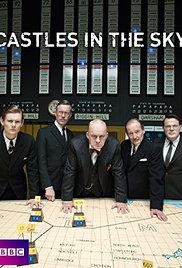
CASTLES IN THE SKY
UK, 2014, 90 minutes, Colour.
Eddie Izzard, Alex Jennings, David Hayman, Julian Rhind- Tutt, Laura Fraser, Karl Davies, Celyn Jones.
Directed by Gillies Mac Kinnon.
Castles in Sky is an interesting film for television, directed by the veteran Gillies Mac Kinnon who made quite a number of small budget films and worked extensively in television series.
The film is the story of Robert Watts Watson, a weather scientist who came up with what eventually became radar detection. Eddie Izzard gives an interesting and very serious performance as Watson. The film takes place between 1935 and 1940, includes a great deal of the contemporary footage of Hitler, the development of the Luftwaffe, the plans for invasion – as well as the British government response.
Watson gives a basic idea to the government officials, played by Alex Jennings and Julian Rhind- Tutt, with constant opposition from Professor Lindemann, David Hayman, who supported equipment development for attack has the best way of defence.
Watson chose workers, not from the universities of Oxford and Cambridge, but rather ordinary workers – with a symbol of not wearing ties. There is a background of Watson’s relationship with his wife, Margaret, Laura Fraser, and the pressure of his continually being away from home and the breakdown of the marriage because of his dedication to his work.
The film develops the work, the details of the experiments, continually getting ideas, testing, lack of financial support, reports to government, gradual improvements, tests which failed, tests which succeeded – and the final sequence where the radar is used during the Battle of Britain in 1940. Watson was knighted in 1942 – and the influence of his insights and developments have had enormous scientific and strategic repercussions and consequences.
1. A tribute to Robert Watts Watson? Inventor? Radar? Contribution to the defence of Britain in World War II?
2. The re-creation of the 1930s, Britain, the countryside, Whitehall, weather scientists, government recruitment, experiments and inventions, developments and difficult financial conditions, support and criticism? The venues for working, old sheds, the coast, the mansion? The tests? The musical score?
3. The title, the reference to the radar centres and their work, linking them along the British coast?
4. The extensive inclusion of footage of Hitler, spirit in Germany in the 1930s, the development of the Luftwaffe?
5. The portrait of Robert, Eddie Izzard’s performance, age, experience, marriage to Margaret, his work with the weather, home life, his nephew and his help? His assistant?
6. The government, the discussions about Hitler’s building plans, the Luftwaffe, the interviews, the eccentric schemes, Robert and his awkwardness dropping the papers, the explanations, the attention Tizzard and Rowe? The choice of him to work?
7. Robert, local, not wanting Oxford dons, the call to Oxford and the phone in the fish tank? Interviews, Taffy and his Welsh background? The symbolism of not wearing ties?
8. Assembling the team, his friend, the official secrets act and death by hanging? Their gathering, the old estate, limited resources, the blackboard, using their ingenuity? Issues of power and speculating on them? Issues of range?
9. The basic principle of radar, the ionosphere, bouncing signals back to earth? The hard work, the difficult tests? Gradual understandings? Robert and his frustration, his apology to the men? The cricket match? Taffy and his ideas? The continued development?
10. Tizzard, his support, the meetings, security? Rowe as the go-between, his wariness, support? The visits of the air chiefs? The continued hostility of Professor Lindemann and, his contact in the staff and being up-to-date with information?
11. Churchill, his coming to power, his convening the meeting, the discussions about the signal, Robert and his explanation of the five castles, Churchill giving the go ahead? The opposition of Lindemann? His contact man exposed, got rid of?
12. The tests, stealing the material from the Navy? Success, detecting the planes, Lindemann wanting low-level detection? Wanting to take over? Robert about to give up? The television set, the smaller valves?
13. Robert and his dedication, love of his wife, their scenes together, the phone calls, the visit to the hotel, his dinner and forgetting it and sleeping, forgetting his wife’s anniversary, going home, her leaving the note? No further information about the relationship?
14. The test, the actual use of radar for defending in the Battle of Britain, sending up the planes, guiding their attacks? Lindemann and his ousting of Robert during the Battle of Britain? Rowe urging him out?
15. The tribute to Watson, his knighthood in 1942, the extraordinary influence on developments in his basic ideas and experiments?
Published in Movie Reviews
Published in
Movie Reviews
Tagged under